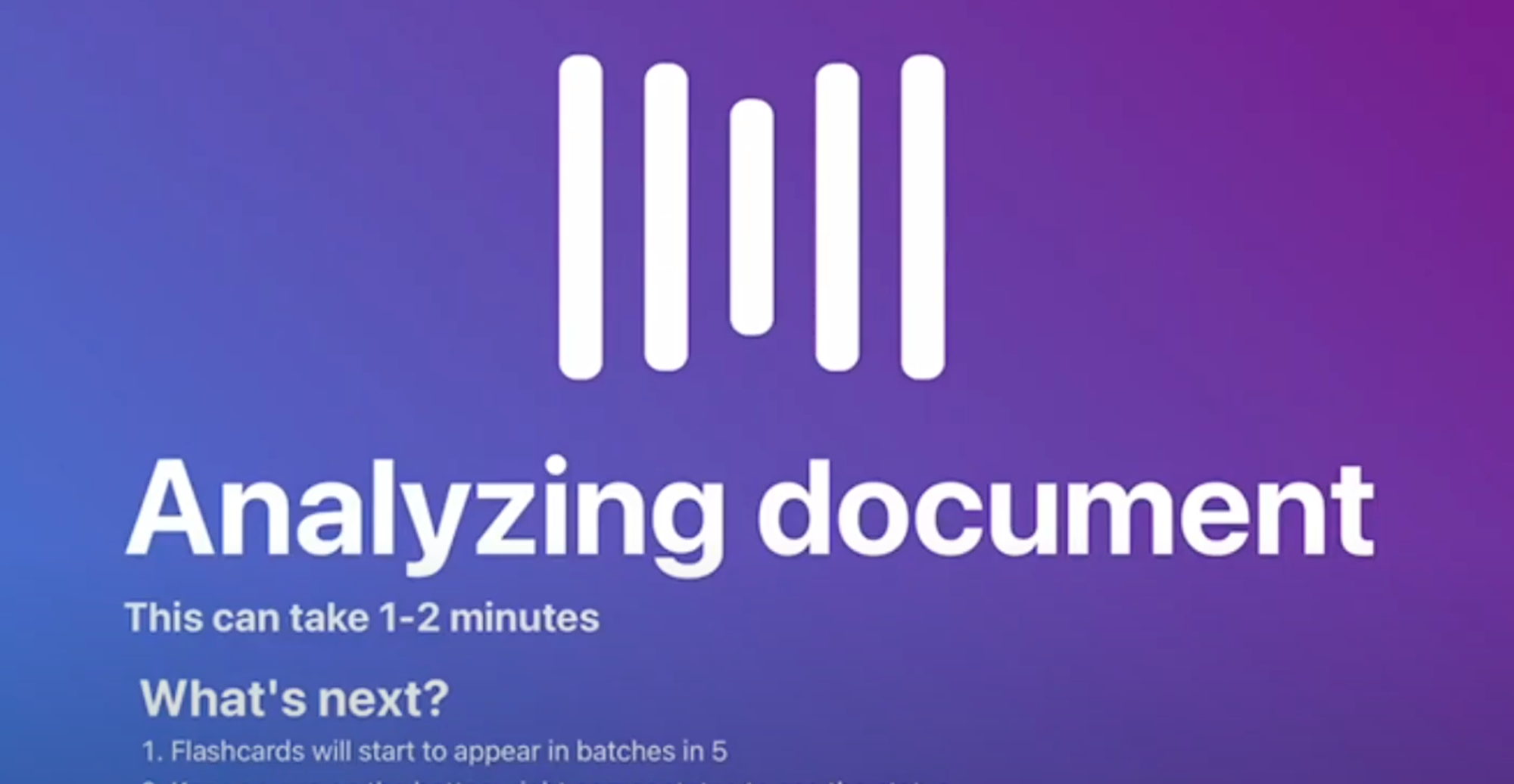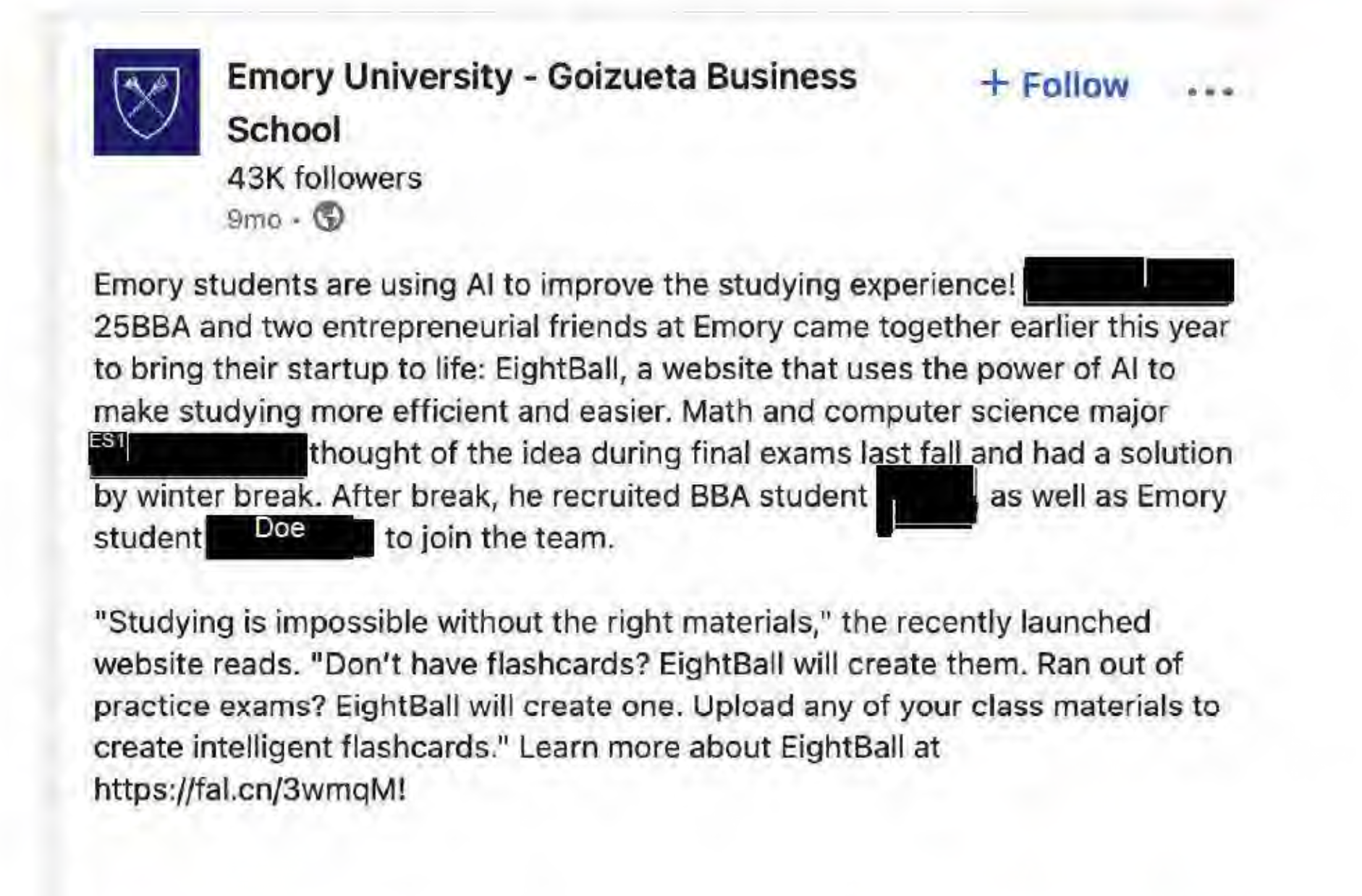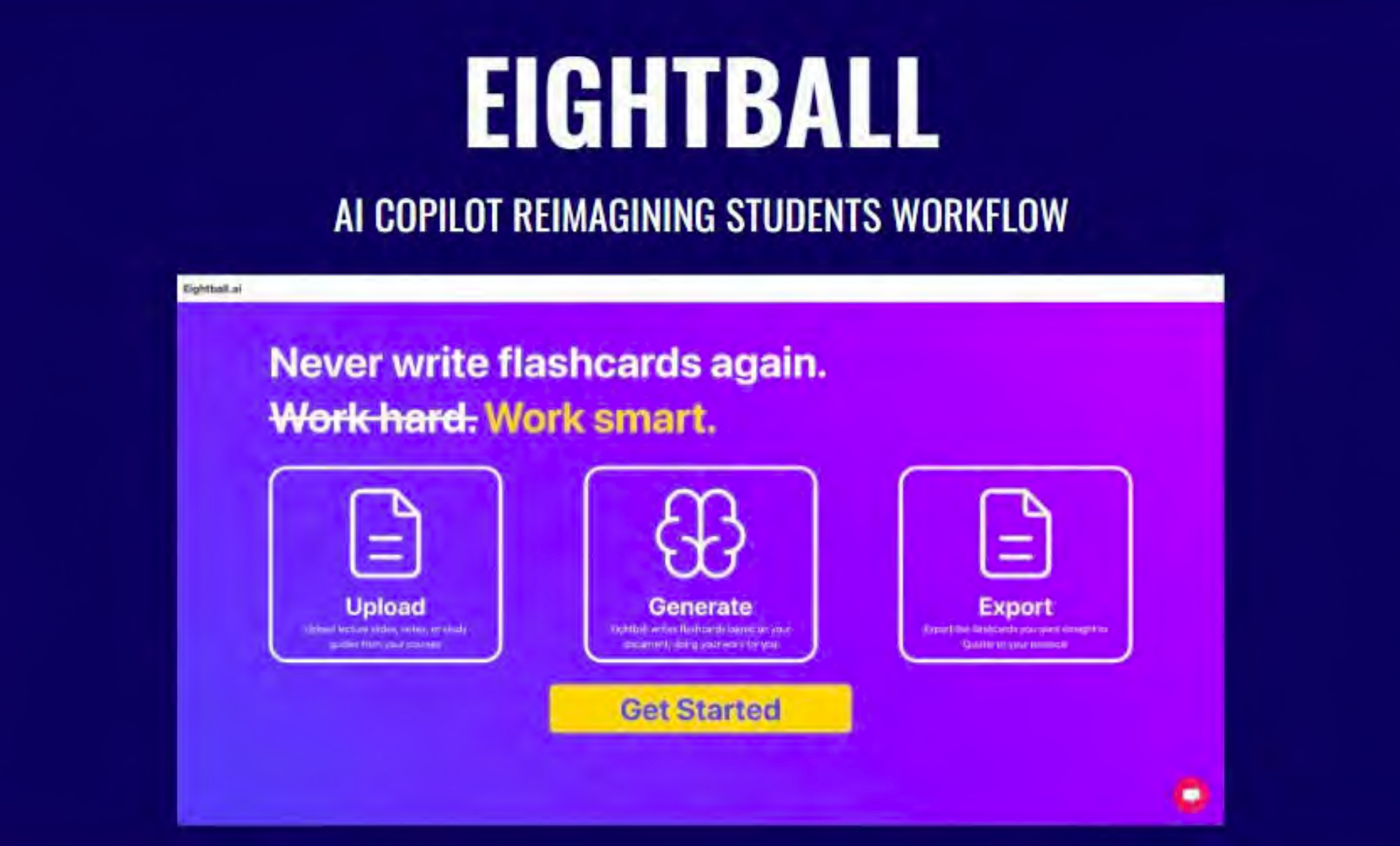This article was produced in collaboration with Court Watch, an independent outlet that unearths overlooked court records.
The student cofounders of an AI studying tool won a $10,000 entrepreneurship prize from Emory University for their idea, were championed publicly and repeatedly by the university’s business school for creating the software, and then were promptly suspended by the school for a semester for building exactly what the school had just given them money to build.
The students were suspended by the school’s Honor Council because their AI tool “could be used for cheating” and because they connected it to a software platform used by the university to host course reading material, homework, and other assignments without obtaining express permission, though this feature was mentioned at the competition it won $10,000 at. But the school’s Honor Council did not actually find evidence that it was ever used to cheat, and a review of the Honor Council’s writeup shows an incredible misunderstanding of how the specific tool, called Eightball, was designed and a misunderstanding of how large language models are trained and what they can do.
“While nothing about Eightball changed, Emory’s view of Eightball changed dramatically,” a lawsuit filed by Benjamin Craver, one of the suspended students against the university reads. “Emory concedes that there is no evidence that anyone has ever used Eightball to cheat. And to this day Emory advertises Eightball as an example of student innovation and entrepreneurship.”

This whole embarrassing saga, revealed in the lawsuit, is another piece of evidence that demonstrates universities and schools more broadly have absolutely no idea how to deal with AI in an academic context and have a misunderstanding of the technology. We have seen mixed messaging from schools about whether or not students should use ChatGPT in any context, have seen students who have been falsely accused of using AI to write essays, and have seen disturbing cases where students use AI to make nonconsensual porn of each other. In each of these instances, it is becoming clear that schools do not know what the rules about AI should be and that they are often being made up on the fly.
There is a lot of detail in this article about what was ultimately an Honor Council proceeding at a private university, but the Kafkaesque proceedings in this case are instructive because they demonstrate how wholly unprepared schools and universities are to deal with even straightforward issues involving AI.
Last spring, the students presented Eightball at the university’s “Entrepreneurship Summit” and were given a $10,000 grand prize to build and launch their software, which allowed students to upload PDFs of course readings, syllabuses, and other material and turn those into practice tests and flash cards. They also explained that they were eventually going to allow users to connect to Canvas, which is a software platform used by the university where professors upload course readings, documentation, assignments, etc, the lawsuit alleges. “By connecting Eightball to Canvas, students would be able to import their course materials to Eightball all at once rather than uploading the same documents individually.”
“Eightball is a platform kind of like ChatGPT but trained directly on your Canvas courses. The way Eightball works is it connects to your Canvas and goes through each of your courses. And for each course it studies the modules, the lectures, the slides, the readings, everything. From there, it becomes a ChatGPT-like experience, but the AI is customized for your course,” one of the creators explains in a demo video. The student then shows that Eightball surfaces directly relevant passages and serves as, more or less, a search-engine for class material.
“Dorm Room Entrepreneur,” the headline of an article on Emory University’s website that was live until I asked the university for comment for this story. “Student co-founds AI-Powered Study Tool Eightball.” The article explains how three students created Eightball, and notes that some professors began recommending that their students use it to help them study for tests.The school promoted this article, and the students’ business and AI tool, in LinkedIn posts: “Emory students are using AI to improve the studying experience!,” one post by the business school reads. The student lawsuit also includes numerous emails sent to the cofounders by professors and faculty at Emory, who said things like “I was very pleased to hear about your startup, Eightball. I congratulate you for your entrepreneurial attitude and for the very interesting idea that you and your business partners had,” and “it looks great.” Andrea Hershatter, the associate dean of Emory’s business school, sent an email introducing the students to a potential outside investor and said “I hope you are having a wonderful summer and finding time and resources to continue your work on EightBall.”
An email the students sent to the team that gave them the $10,000 prize explained their plans to connect to Canvas: “To reiterate, Eightball essentially just shows you students’ materials from their Canvas courses - sort of like an advanced search inside Canvas, and is not capable of solving complete homework problems or writing essays or anything of [the] sort,” the email says.

It is not clear, exactly, what changed at Emory that made the university take action against a startup that it went out of its way to promote, but both the lawsuit and the Honor Council writeup asserts that the university’s IT department was angry that the company allowed students to connect their own Canvas API tokens to the app. In the lawsuit, the students’ lawyers write that the university changed the settings within Canvas and “hid the button that generates Canvas [API] tokens, but it did not inform [the students] that the change was in response to Eightball’s newly available method for uploading course materials.” Soon after this, “Emory informed [one of the students] that he may have violated Emory’s Undergraduate Code of Conduct by Connecting Eightball to Canvas.” The students shut Eightball down at this point.
After all of this promotion, the university’s Honor Council launched an investigation into the students and Eightball. This investigation, which can be read here, found that Eightball had not been used for cheating, and that the students had not lied about the capabilities of the software. It also did not dispute that the school both funded and championed the software. The council recommended that the students be suspended for a year, anyway. Jason Ciejka, the director of the school’s honor council, wrote “this case is unprecedented in terms of its scale and potential to harm the Emory community.”
School officials suggested that students choosing to use their own API tokens in the way that they are intended to be used by Canvas the company was a massive security risk.
The school “figured out that the Eightball program accesses the Canvas data through the Canvas user generated token, which is essentially users’ Emory credentials that give full access to everything users can access on Canvas. This user generated token is considered a highly restricted user credential tool and sharing it to any outside party is a violation of Canvas terms and IT policies.” API tokens are sensitive, but API tokens exist exclusively for users to connect accounts to outside services—what the Honor Council is describing is essentially the only use for an API token, and is a feature of Canvas which the Honor Council wrote “is not something that they can turn off.” Canvas’s own documentation explains to students how they can use use API tokens to connect their accounts to other apps: “Access tokens provide access to canvas resources through the Canvas API. Access tokens can be generated automatically for third-party applications or created manually.”
IT attempted to hide this feature, but students found a workaround and “were continuing to circumvent it to generate tokens.” Because of this, they were also accused of “rewriting code to circumvent an IT security measure” (the “workaround” involved right clicking on the Canvas website, clicking “View Source,” and copy-pasting the credential.)
One of the witnesses the Honor Council called said that “this application was being marketed through various Reddit posts as a ChatGPT for Canvas,” and then said “From the security perspective, people cannot give full access of their data to someone else. The fact that it was OpenAI which got the access made the case even worse because OpenAI is trained on data. Once people feed it with these personal data, it could answer others’ questions based on searching through all these materials, potentially leading to copyright problems etc.” But the students explained that their program “did not use ChatGPT at all.”
The students were also accused of “disseminating course material” by allowing students to use their own, individualized Canvas API tokens to connect Eightball directly so they did not have to upload PDFs to the tool themselves. “The upgrade did not change what students could upload to Eightball or what learning materials Eightball could produce upon request,” the suspended students’ lawyers note in the lawsuit.
Despite all of this talk about Canvas, the Honor Council’s report and writeups of what happened to the students makes clear that the university was very concerned about “the cheating potential with this program,” and the students were accused of cheating,” “plagiarizing,” and “intentionally helping or attempting to help another person to violate any provision of this Honor Code.”
According to Eightball’s marketing, the lawsuit, and Emory University’s own writeups, Eightball was not actually a cheating tool. As far as AI-tools go, it seems innocuous, and the university did not provide any examples of the tool ever being used for cheating. “Unless answers are directly in the course materials, Eightball cannot make up anything for non-existing answers.”
The Honor Council wrote “the fact that Emory gave them the grant implies that Emory was supporting them. While the Honor Council can understand this position taken by the student, we fundamentally disagree that this places the onus on the university to ensure the ethical development of this tool. All students should carry the Honor Code and the value of academic integrity as their leading principle. Moreover, this application has already reached other educational institutions and has the potential to create widespread cheating across colleges and universities that were unaware of this flaw in Canvas.”
Emory University declined to comment on this story. Craver's attorneys declined to comment for this piece.


